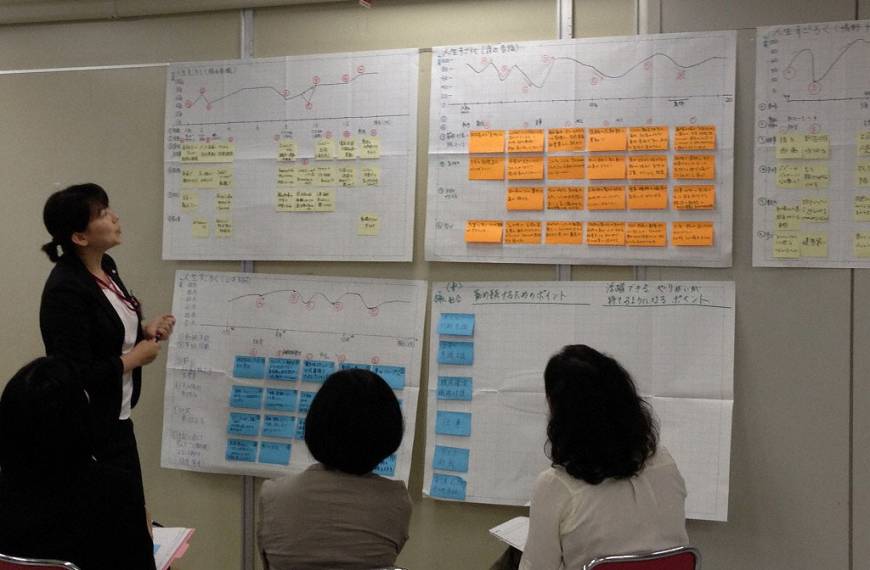By Naohiro Yoshida
The Japan News, Tokyo / Asia News Network.
TOKYO (The Japan News/ANN)
Whether it’s associations of people with particular professional licenses or networks spanning an entire industry, the number of women-only work groups are growing.
In an environment where women may have doubts about male-focused professional associations or feel alone due to scarcity of women in their industry, these groups fill a variety of roles, such as offering working women who are raising children the chance to improve their skills and opportunities to talk about their problems.
“This drug management file looks like it’s easy to use.” “Why don’t we share this with the other members of the association?”
Three women were having a discussion at a pharmacy in Kawasaki. They were Michiko Hori, 61, the head director of the Japan Ladies Independent Pharmacy Association (JLIPA), and two directors: Chiyoko Ishikawa, 66, and Mutsuko Watanabe, 69.
The association was founded in May 2015 in response to suggestions that women pharmacists work together to improve their working environment. Membership grew to roughly 190.
Of the 280,000 pharmacists in the country, about 170,000 — more than 60 per cent — are women. Yet none of the top 16 executives of the Japan Pharmaceutical Association (JPA), which comprises executive directors or higher positions, are women. There are also few training programs that women pharmacists can take part in.
Hori and her associates are working to develop at-home learning computer software so pharmacists can watch training videos on topics like how to read the latest medical test data. The program is being created in response to input from women pharmacists who, due to child-rearing duties, work limited hours but nevertheless would like to boost their professional skills.
“It’s difficult for men to understand how women with limited working hours work. We want to carry out education at a very detailed level, to accommodate the situations that individual women are in,” said Hori enthusiastically.
In construction industry, which is dominated by men, a women’s network group was set up in 2014 within the Japan Society for Finishings Technology.
Yasuko Kumano, 55, who serves as the head of the group and works at general contractor Fujita Corp., said an increasing number of women at construction sites told her they had no other women to talk to. “I wanted to set up a place where women could share their problems with other women,” Kumano said.
Junko Morishima, 50, who works at the Chiba office of construction firm Toyo Kaken Co., said: “Most of the people I work with are male craftsmen, and I was looking for a chance to talk with other women about good ways to give orders.”
After taking part in an event by the group in June last year, Morishima was encouraged by the realisation that “there are lots of women working at construction sites.”
Looking for role models
IP Woman, a group of women working in the field of intellectual property that meets over meals at restaurants, is seeking to widen its network in an atmosphere akin to casual women’s get-togethers known as joshi-kai.
An overwhelming 86 per cent of patent attorneys working with intellectual property are men. Because many of the offices where patent attorneys work are small, a woman patent attorney often has no female colleagues.
Mika Shibata, 36, a patent attorney at major ink manufacturer DIC Corp. who wanted to create opportunities for women patent attorneys to chat among themselves about work-related concerns or industry conditions, formed IP Woman in June last year. It now has about 40 members.
One 37-year-old woman is the only female patent attorney in a Tokyo office of about 30 people. Her job involves a lot of paperwork, leaving her uneasy about how she works, and she found it difficult to share her thoughts with those around her since they are all about the same age as her father.
When she revealed her concerns to an experienced patent attorney over wine at an IP Woman get-together, she was relieved to hear that paperwork is the foundation of intellectual property work and therefore very important.
Shibata said, “I want the members to use the group casually, to find a role model or talk about the difficulty of balancing work and family in a free, relaxed atmosphere.”
Benefit from real experience
How can women-only groups be used most effectively? According to Prof. Naoko Irie of Kanagawa University, who specialises in adult learning: “What’s most useful for work is not theory, but examples from experience work out.’
“Women who meet up in these groups should chat about what work they do, and if they are doing similar work then they should exchange advice on how to do it. These occasions are precious because women don’t have as many opportunities — like drinking parties — as men do to hear about the practical experiences of their bosses and senior coworkers.
“Once they feel at home in a group, I recommend they become actively involved in running it. When they start to deal with questions, such as whom to invite to a meeting or how to allocate responsibilities, then they acquire skills for running an organisation.”














































































































































































































































































































































































